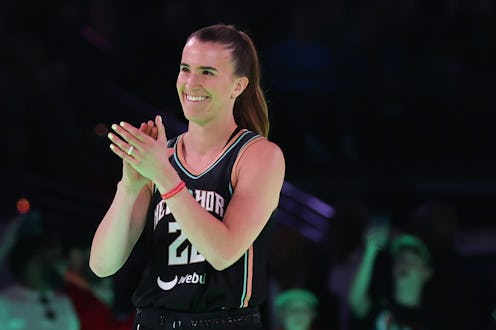Bustle Exclusive
March Madness Is For The Girls
Ahead of tournament tip-off, WNBA hotshot Sabrina Ionescu reveals the team and players she’s watching.

Sabrina Ionescu changed the game of basketball long before she was a pro. As point guard for the Oregon Ducks, Sab was so good, so entertaining, that sports analysts credited her with rising attendance rates for women’s college hoops around the country. All signs pointed to an epic senior send-off as the Ducks prepared for the 2020 March Madness tournament. But that was March 2020 — you know the rest.
“It’s always hard to watch March Madness and to realize that I never ended my college career how I wanted,” says Ionescu, who was the No. 1 WNBA draft pick in 2020 after graduating. “It brings a different level of appreciation for being able to play the game you love.”
Four years later, in an environment of explosive growth for women’s sports, women’s hoops are on a hot streak, taking over TV ratings and timelines with the kind of big, culture-shifting moments that make sports resonate beyond the game. The WNBA is gearing up for its biggest season ever; tickets for the draft in April sold out in just 15 minutes and the Las Vegas Aces just sold out season tickets, a first for any team in league history. And Ionescu, now a guard for the New York Liberty, made headlines when she took on Steph Curry in a three-point contest earlier this month. (Ionescu lost to Curry by one shot — but beat or tied every other NBA player in the All-Star contest.)
As we gear up for March Madness this week, the biggest tournament in college sports, it’s clear this one is for the girls.
“People are talking about the women’s tournament a lot more than they are talking about the men’s right now,” says Ionescu, who appears in an AT&T commercial set to air during the games with New York Knicks’ Jalen Brunson. “The numbers don’t lie.”
This year, viewership for women’s college basketball officially outpaced men’s, a historic jump largely being attributed to yet another phenom on the court: Iowa Hawkeyes player Caitlin Clark, who broke the NCAA scoring record earlier this month for all genders. Almost overnight, Clark became a household name, and analysts are already name-checking Clark in projections that women’s sports will reach a $1 billion valuation in 2024.
“People are talking about the women’s tournament a lot more than they are talking about the men’s right now.”
For Ionescu, seeing this enthusiasm skyrocket is “pretty crazy.” When March Madness resumed in 2021, the NCAA was pilloried for glaring gender inequities between the men’s and women’s tournaments. (Remember those viral photos and videos of the lone rack of dumbbells and sad pile of yoga mats constituting the women’s “weight room”?) An independent investigation following the tournament found that the NCAA prioritized men’s basketball “over everything else,” and to the detriment of the women’s game, perpetuated “a mistaken narrative that women’s basketball is destined to be a ‘money loser’ year after year.”
In 2022, the NCAA allowed both tournaments to use the lucrative March Madness branding for the very first time. Just two years later, the gals are all anyone seems to be talking about.
“Being able to see the growth in such a short amount of time across all aspects of March Madness — the visibility, the games being televised, jersey sales, the fans in attendance — it’s something that I look forward to every year,” says Ionescu.
This year, Ionescu has her eyes on South Carolina (“It’s been amazing to see their level of excellence over such a long period of time where there’s really been no drop-off.”), USC’s JuJu Watkins (“Seeing what she’s been able to do having a tough transition from high school to college has been amazing to watch.”), and UConn’s Paige Bueckers (“She attacks the game at such a high level.”).
More than anything, she’s excited to see these athletes finally getting the respect they deserve. “Everyone fighting for equality and not taking no for an answer has led us to where we’re at now — where a lot more eyes are on the game because they actually respect it,” she says. “This isn’t about checking off a list to support women’s sports. There are true fans who love to watch the game and want to be part of the players’ journeys.”